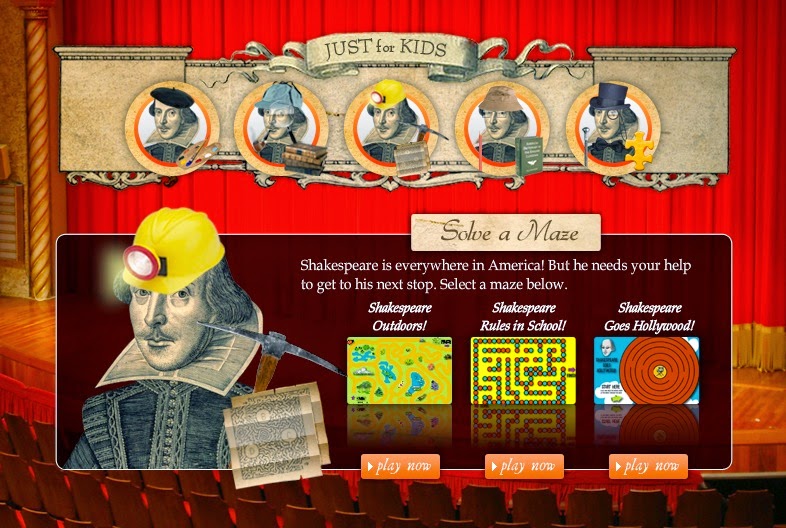Please join my fellow TpT English teachers in this great giveaway hosted by David Rickert! ALL of the resources can be used with ANY Shakespeare play. And please share why YOU love teaching Shakespeare in the comments below.
Six English teachers with a love for Shakespeare are hosting a giveaway in honor of Shakespeare's birthday. (It's also the 400th anniversary of his death.) One lucky winner will get six great lessons that can be used with ANY Shakespeare play. So what can you win? Click on the links to get a preview and find out how to enter.
Presto Plans has a lesson on Shakespeare's Language called "What Would Shakespeare Say?"
Need some room decor? Room 213 is offering a Shakespeare Word Wall and Posters.
Tracee Orman has a great way to introduce Shakespeare with a Life and Times Power Point.
The Classroom Sparrow has a handy reference guide with her Shakespeare Mini Book.
Reach for the stars with Brynn Allison's Astrology Based Characterization Activity.
David Rickert's Comic Lesson on Iambic Pentameter will introduce students to the way Shakespeare writes.
The raffle will run from Sunday, April 24th to Sunday, May 1st. How do you enter? Simply click the link below and enter your favorite Shakespeare quote. It's that easy.
a Rafflecopter giveaway
So why do these teachers love Shakespeare?
Presto Plans:
"Since students often feel that Shakespeare isn’t relevant today, my goal when I teach his work is to find ways to relate the plot, characters, and themes to their lives. What I enjoy most about teaching Shakespeare is seeing my students make a personal connection to universal themes (loyalty, ambition, jealousy, betrayal) that emerge in his work. When students can make those connections, the class discussion always becomes far more interesting and engaging, and I know Shakespeare still has a place in today’s classroom."
Room 213:
"I love teaching Shakespeare because not only is he a brilliant writer, but he understood what makes we humans tick. What I enjoy most of all, though, is finding ways to draw students into his plays. Most have preconceived notions and dread when it comes to Shakespeare, but I design my lessons and activities in a way that helps connect the plays to their lives and, that way, it's more interesting and enjoyable for them."
Tracee Orman:
"I love the moment when students hear famous lines spoken that they never realized were penned by Shakespeare. Today in class we covered Marc Antony’s “Cry Havoc! and let slip the dogs of war” quote in Act III of The Tragedy of Julius Caesar. After that scene, I showed them the beginning of an episode of Big Bang Theory where Sheldon quotes the phrase after he seeks revenge on the person who hacked his World of Warcraft account and stole his weapons. There are so many great allusions, quotes, parodies, and references to Shakespeare; I love opening their eyes to them. When former students email or post/tag examples or references they come across on my social media pages, it warms my heart to know they not only still remember this play from sophomore year, but they actually understand the reference or allusion."
The Classroom Sparrow:
The best part about teaching Shakespeare is the level of engagement the plays can bring to a classroom. Most students are not excited about Shakespeare because they have a hard time understanding the language, but once they start reading the first few acts, the students are eager to find out what will happen next. By the end of the unit, students have a better appreciation for Shakespeare in that many of his themes are timeless.
Brynn Allison:
"Reading any of Shakespeare's works is difficult for my students, many of whom read several levels below grade level, but this challenge is what makes teaching Shakespeare so rewarding. My students are incredibly proud of themselves when they begin to read and understand his plays. Acting out key scenes and making connections between the timeless themes in Shakespeare's dramas and real world issues helps to increase students' comprehension. Have students practice insulting each other using Shakespeare's language before reading the first scene in Romeo and Juliet or by conducting a People magazine-like interview of Portia and Calpurnia from Julius Caesar. Activities like these help students to see that world in Shakespeare's plays is not so different from their own."
David Rickert:
"I love the challenge of teaching Shakespeare to students who are reading it for the first time. I love his plays. They have comedy, tragedy, thrills, chills, and just all around great writing. There are some wonderful metaphors in the plays, and I find myself using them in everyday language without thinking about it."
Good luck!
a Rafflecopter giveaway



























